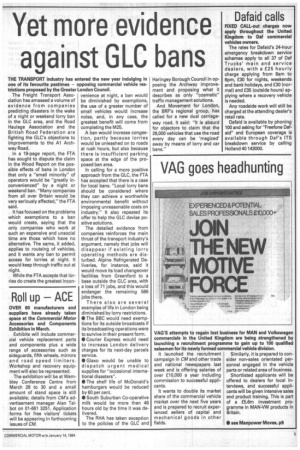Yet more evidence against GLC bans
Page 7

If you've noticed an error in this article please click here to report it so we can fix it.
THE TRANSPORT industry has entered the new year indulging in one of its favourite pastimes — opposing commercial vehicle restrictions proposed by the Greater London Council.
The Freight Transport Association has amassed a volume of evidence from companies predicting disasters in the wake of a night or weekend lorry ban in the GLC area, and the Road Haulage Association and the British Road Federation are fighting the GLC's objections to improvements to the Al Archway Road.
In a 19-page report, the ETA has sought to dispute the claim in the Wood Report on the possible effects of bans in London that only a "small minority" of operators would be "greatly inconvenienced" by a night or weekend ban. "Many companies from all over Britain would be very seriously affected," the ETA said.
It has focused on the problems which exemptions to a ban would create, saying that the only companies who work at such an expensive and unsocial time are those which have no alternative. The same, it added, applies to routeing of vehicles, and it wants any ban to permit access for lorries at night. It would keep through traffic out at night.
While the ETA accepts that lorries do create the greatest incon venience at night, a ban would be diminished by exemptions, the use of a greater number of small vehicles would increase noise, and, in any case, the greatest benefit will come from completing the M25.
A ban would increase congestion, partly because lorries would be unleashed on to roads at rush hours, but also because there is insufficient parking space at the edge of the proposed ban area.
In calling for a more positive approach from the GLC, the ETA has accepted that there is a case for local bans. "Local lorry bans should be considered where they can achieve a worthwhile environmental benefit without imposing unreasonable costs on industry." It also repeated its offer to help the GLC devise positive solutions.
The detailed evidence from companies reinforces the main thrust of the transport industry's argument, namely that jobs will disappear if existing lorry operating methods are disturbed. Alpine Refrigerated Deliveries, for instance, said it would move its load changeover facilities from Greenford to a base outside the GLC area, with a loss of 71 jobs, and this would endanger the remaining 586 jobs there.
There also are several examples of life in London being diminished by lorry restrictions.
• The BBC would need exemptions for its outside broadcasts if its broadcasting operations were to survive in their present form, • Courier Express would need to increase London delivery charges for its next-day parcels service.
• Glaxo would be unable to dispatch urgent medical supplies for "occasional international disasters".
• The shelf life of McDonald's hamburgers would be reduced by 60 per cent.
• South Suburban Co-operative milk would be more than 48 hours old by the time it was delivered.
The RHA has taken exception to the policies of the GLC and Haringey Borough Council in opposing the Archway improvement and proposing what it describes as only "cosmetic" traffic management solutions.
And Movement for London, the BRF's regional group, has called for a new dual carriageway road. It said: "It is absurd for objectors to claim that the 26,000 vehicles that use the road every day can be 'magiced' away by means of lorry and car bans."








































































